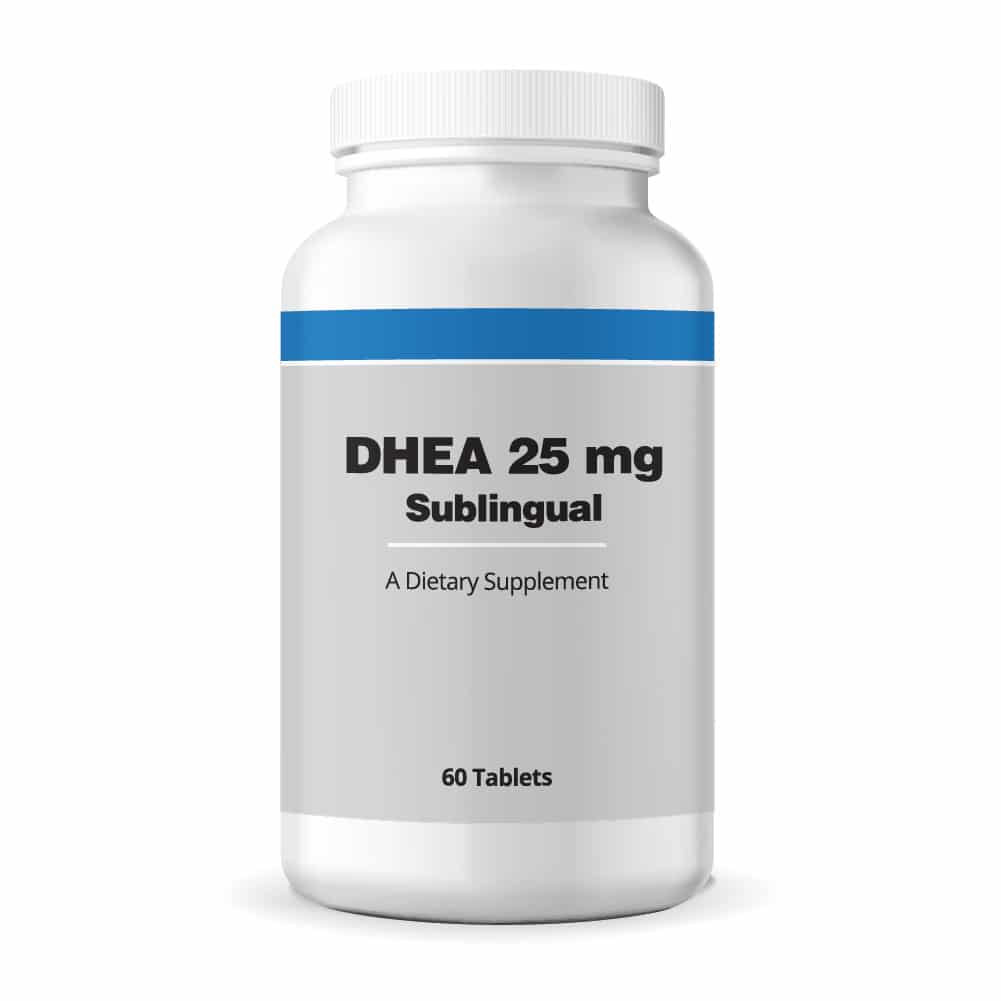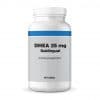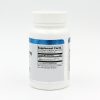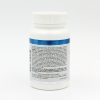DHEA at a glance*
- A necessary hormone that helps produce other hormones like testosterone and estrogen.
- May help support your heart.
- May support bone density in women.
- May be used to slow down the sense of aging and increase feelings of well-being.
DHEA
Dehydroepiandrosterone: Seeking Hormonal Health
DHEA is one of the most abundant hormones in the body. It has important functions, including the production of other hormones, especially in women, such as testosterone and estrogen. It is produced by the adrenal glands and to some extent by the ovaries and testes (15-30 mg/day). After undergoing chemical changes within the body, it can change into other hormones. Our peak levels of DHEA occur at age 25 and decrease as we age by 90%. DHEA has been called an anti-aging hormone because it is thought that deficiencies of DHEA in old age may make individuals more susceptible to cancer of the breast, prostate, bladder; atherosclerosis; hypertension; autoimmune diseases (e.g., diabetes, systemic lupus erythematosus, rheumatoid arthritis); osteoporosis; high cholesterol; obesity; memory disturbances; chronic fatigue; and manifestations of aging. Higher levels of DHEA in the elderly have been shown to increase feelings of physical and psychological well-being; increase immune cell production; and enhance mood, energy, and sleep. Older individuals with higher DHEA levels are often in better health than individuals with lower levels.
Where Do DHEA Supplements Come From?
The pure form of DHEA is made in laboratories from wild yams found in Mexico. Some extracts from wild yams are marketed in health food stores or grocery stores as “natural DHEA” even though there is no true DHEA chemical present. These extracts are supposedly converted into DHEA by the body. However, because it takes several chemical reactions to convert these plant extracts into DHEA, it is unlikely that the body can make DHEA from these supplements. Other supplements labeled as DHEA actually have much less than the amount stated on the label. Thus, only pharmaceutical grade DHEA from a known, reputable, tested source should be used.
What Is DHEA?
DHEA is a hormone. It is a weak androgen (“male” type hormone), producing various masculine effects such as increased muscle mass and male pattern hair growth, depending on blood levels. It is synthesized in large quantities in men and women by a gland near the kidneys known as the adrenal cortex. However, it can be converted into more potent hormones (testosterone and estrogen) throughout the body as needed.
Research involving DHEA shows promise in:*
- Heart disease
Men with heart disease often have low levels of DHEA-S. In one study, healthy men with low levels of DHEA-S were three times more likely to eventually die of heart disease than those with higher, optimal levels of DHEA-S. - Obesity
Experimental animals given DHEA did not become obese, but a control group given no supplements did become obese when given the same amount of food. - Aging
Significant positive changes (e.g., less muscle wasting, less memory loss, improved mood and energy) have been seen in elderly men given DHEA. - Osteoporosis
DHEA given to postmenopausal women increases bone strength. - Cancer
In one study, experimental animals bred for breast cancer did not develop cancer when given DHEA supplements. - Autoimmune Disease
Low levels of DHEA have been found in patients with autoimmune disorders (e.g., lupus erythematosus, rheumatoid arthritis, multiple sclerosis, ulcerative colitis, AIDS). In studies, DHEA supplements have been shown to improve stamina and overall sense of well being in patients with autoimmune disorders. - Lupus
Patients with lupus treated with DHEA have shown symptomatic improvement, especially of kidney function, often permitting a reduction of their corticosteroids. - Depression
DHEA has been used experimentally to treat depressed patients. Improvements in both depression and memory were observed. - Performance Enhancement
Because DHEA is thought to build muscle mass, reduce abdominal fat, and reduce recovery time following injury, it is popular with athletes. However, human studies are needed to verify these claims. - Sexual Performance
DHEA is used to enhance sexual performance. In women it can raise testosterone levels, which often enhances sex drive and sexual response.
Dosage Recommendations
Suggested Usage:
DHEA is only recommended on a case-by-case basis to certain individuals, after medical testing, including blood levels. Pharmaceutical grade DHEA is available at without a prescription, but should only be used if a health care provider has specifically discussed it with you and recommended it.
Precautions & Safety
NOT FOR USE BY INDIVIDUALS UNDER THE AGE OF 18 YEARS. DO NOT USE IF PREGNANT OR NURSING. Consult a physician or licensed qualified heatlthcare professional before using this product.
High doses of DHEA are associated with negative side effects for both men and women. Blood tests should be performed to monitor levels. However, the administration of high doses may be appropriate when treating serious illness (e.g., autoimmune disease). High levels may inhibit the body’s natural ability to synthesize DHEA and may be toxic to the liver. In addition, women should be alert for any signs of masculinization because the end products of DHEA in women are androgens (male-type hormones). Possible signs include loss of hair on the head, hair growth on the face, weight gain around the waist, a lowered voice and acne. Men should also be alert for signs of excess testosterone (e.g., sexual aggressiveness, testicular atrophy, aggressive tendencies, male pattern baldness, and high blood pressure). Blood levels of DHEA should be monitored periodically, typically every six months, and only pure, pharmaceutical grade DHEA should be taken.
Keep out of reach of children.







